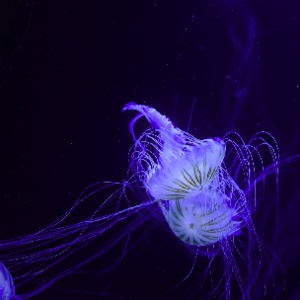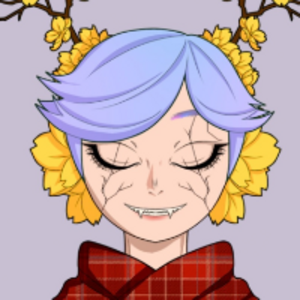III.
It wasn’t long until we reached our destination. A large, two-story house with lots of windows. The open windows made me irrationally nervous. It was very strange for me to see a Terran house. Martian homes were essentially apartments within the main colony building, and there were no windows at all, since there was neither breathable air outside, nor any sort of landscape worth watching.
I followed Sophia into the house. There, I was greeted by her mother, Mrs. Melo, and she flooded me with questions about my journey between worlds, and about what my life was like, back home.
Not many people born in Mars — Martians, as we’re called — have come to Earth in the past. Interplanetary travel is largely reserved to researchers and engineers working on solutions to benefit both worlds. A few rich Terrans pay small fortunes to have a “vacation on Mars,” but these don’t actually come to the colonies. They go to special installations designed to provide for their needs. It is both a convenience for them, and a security matter for us, since planetary protection protocols are strict on health concerns. I would know. I had just spent my first three weeks on Earth in a quarantine bay getting shots and undergoing exams.
Besides, I don’t think rich Terrans would enjoy the colonies, anyway. Rich Terrans love money, or so I’m told, and money was one thing they’d definitely not find in the Martian colonies.
So Terrans do come to Mars from time to time. But for a Martian, travel to Earth isn’t usually possible. We don’t use Earth’s currency — or any currency, for that matter —, so how can a Martian afford such an expensive journey?
In my case, I owed it to Mrs. and Mr. Melo.
“Coming to Earth... undergoing transference... that must have been a hard decision for you.”
We were alone in Sophia’s bedroom, where I discovered there was already a bed, a wardrobe and several clothes waiting for my arrival.
“It’s either that or dying,” I explained. “This body won’t withstand much longer. And I hear that for the transference to work, the sooner you get it done, the better.”
“Usually, yes,” said Sophia. “I mean, that’s definitely true in your case, since you have a degenerative neural disease. The more of your brain dies, the more of your neural map will have to be inferred and reconstructed by the scientists at the lab.”
“You... know a lot about this,” I remarked, surprised.
Sophia giggled. “Well, obviously. You know my dad, and what he works with. He’s the one who managed to convince the company to realize your transference pro bono. They’re interested in Martian brains, a lot of people want to know what the neurological effects are of growing up in another world. Besides, you will be the first Martian synth ever, which is pretty cool.”
I smirked.
“Can I ask you something?”
“Sure,” said the girl. “Hit me.”
“Why did they do it?” I asked. “Your parents, I mean. Why did they decide to help me? That’s a lot of money for someone who can barely be considered a part of your family.”
“Well...” Sophia stared at the ceiling for a moment, probably searching for the right words. “I guess this is partly because of me.”
I furrowed my brow. “What do you mean?”
She smiled. “Okay, so here’s a funny story: For some reason, people love to ask me why I use a wheelchair. And I hate talking about it, so either I tell them to piss off, or I make up some funny story about fighting a mutant dog that bit me and infected me with a zombie virus, which was then neutralized but unfortunately paralyzed my legs. You wouldn’t believe how many people actually believed that story when I told them.”
I laughed. “That’s clever. I love it.”
“So anyway,” said Sophia, smirking. “I don’t usually tell people this, but I trust you and I feel that you have the right to know. The truth is that, dad didn’t always work in synth science. But three months after I was born, I caught a serious disease. It spread through my body quickly and caused a lesion in my spinal cord. There’s no cure for this. And that’s when dad decided to work at Echo Robotics. He wanted to give me a choice. To keep living as an organic human being, or to get a replication, and become a synth, recovering the ability to walk. Get it?”
I nodded. “But what does this have to do with me and my disease?”
“I didn’t do it,” Sophia declared. “I chose not to get the transference, Lyra. Dad worked on this his whole life to give me the choice, and in the end I chose to remain an organic. Because I love my body, and I love who I am, and I don’t want to die and be reborn as a synth. So, last year, when your step-father contacted him about your disease, I think he felt that this might be his chance to give his work meaning. By helping you, instead of me.”
“That’s... a lot to take in.”
“I know,” said Sophia. “I mean, it’s just a hunch, but I’m pretty sure that’s what’s on his mind...”
Wait a minute.
Something Sophia had just said sounded weird.
“What did you mean, ‘to die and be reborn as a synth’?”
Sophia wrinkled her forehead, surprised, and stared at me wide-eyed. “Wait... you don’t know? I thought dad would have explained everything to you, already.”
“All I know is the information that’s available on the Mars net,” I told her. “I’ve received some leaflets from Echo Robotics about it, and I read those too. But I don’t know much about how this works. It’s supposed to transfer me from this body into an android one, right?”
Sophia turned around in bed, and covered herself with a blanket.
“Good night, Lyra.”
I felt a tug of apprehension within my chest.
“Tell me.”
Silence.
“Sophia, tell me, please. I want to know what’s going to happen to me. Please... cousin?”
Still silence. I wondered if Sophia had heard me at all. She could have been fast asleep, already. But then I heard an indistinct whisper.
“...”
“I’m sorry, I didn’t catch that,” I replied.
“You’ll die,” said Sophia, louder this time. She turned around to face me, and saw the surprise and mild horror on my face. “Sorry, I know I shouldn’t have told you this.”
“What do you mean by that?” I asked.
Sophia frowned. “Look, I don’t mean to scare you, but I’ve read a lot of dad’s work stuff, and the whole thing is much different from what the marketing department of these robotics companies will make seem. You see... the procedure they call ‘transference’... at first, it was called ‘replication’. And ‘synths,’ or ‘synthetic human bodies,’ they were originally called ‘replicas’ in academic papers. There’s no way to transfer a consciousness to a robot, because we don’t really know what a consciousness is. So what they do is this: they take your brain off your body and run it through a machine that analyzes every single cell, ion and protein within it. With this information, they’re able to create a map of your brain, exactly as it was in the moment it was extracted from the body. A huge map. Like... blueprints for your brain. That’s what we call a connectome.”
I tried to assimilate what I was hearing. Sophia had a way of explaining that made even those complicated concepts easier to grasp, but they were still complicated either way.
“Okay. And what is this map for?” I asked.
“They use it to create a virtual copy of your brain,” she replied. “It works exactly like the real thing, but it runs within a computer. The cells and the proteins, everything in your brain is reproduced virtually. That’s where the term comes from. Replication. To replicate your brain in detail within an artificial human being, a synth, as we now call them.”
“Wait, like a simulation?”
“That’s one way to put it, I suppose,” said Sophia.
“So it’s not real?” I asked, shocked. “It will just be a robot pretending to be me?”
“No,” she interjected. “It will be you. All of her thoughts, her ideas, her memories, it will all still be exactly the same as they are now.” That conversation was scaring me. “Lyra, listen to me. Synths are alive. They think, and feel, and know they exist. They feel happy, and sad, and angry, and scared, just like every other human. They fall in love. Synths are real humans, Lyra. It doesn’t matter if your brain is made of organic or inorganic matter, we are all still human.”
“But it won’t be me,” I realized. It was the logical conclusion to Sophia’s argumentation. “It will be like a clone, or... a twin, maybe? Something — sorry, someone, — that’s exactly like me, but isn’t this me. If what you’re saying is true, I... really will die in that laboratory.”
I felt on the brink of tears. For so long had I waited! Six months in Mars dealing with the paperwork for a green card and migration documents, two months waiting for the right season for interplanetary travel, three weeks in a Martian quarantine bay, another six months in a spaceship... and only now was I learning about this? I felt cheated on.
“I should never have left Mars,” I said, feeling miserable.
“Hey, hey, come here,” said Sophia. She moved to the side, on the bed, and patted the empty space beside her.
“You mean... in your bed with you?” I asked, hesitating. The girl just nodded. I moved over to her bed, unsure if this was a Terran cultural thing, a Rio de Janeiro thing, or just a Sophia thing. Probably the latter. I lay down beside her, head on one end of her pillow, and we faced each other.
“Are you okay?” she asked.
I sighed. “Well, truth be told, no, I’m not,” I admitted. “Sophia, I have a fatal disease with no known cure for, and I was just about to accept that I was going to die, and then someone tells me they can make me live longer by migrating my brain into a robot. I thought I had been given an option. I wasn’t. I’m just going to die either way.”
“I can’t imagine what it’s like,” said Sophia. “And I’m sorry you have to go through that. I... I think I should never have told you this.”
“Yes, you should,” I said, with resolution. “I needed to know the truth. Thank you for telling me.”
Sophia flashed me a half-smile. “What are you going to do now? Are you still going to get the replication? You... don’t have to go back to Mars, you know? Even if you decide not to get it, we would be glad to have you living here with us.”
At that moment, I couldn’t really think of what to do. My emotions were in a turmoil. But at very least, I had Sophia there beside me.
“Thanks, Sophia. You really are sweet, did you know that?”
She smiled, and tried to brush it off. “I’m just normal,” said the girl.
IV.
Waking up in the Melo house left me a little disoriented. For a moment, after I opened my eyes, I had no idea where I was. I stared at the empty bed beside me, trying to piece together the little bits of information I was seeing into some sort of coherent idea of what was going on. I wasn’t in the spaceship, or in the isolation ward at the station. I remembered leaving the station, and then—
Sophia!
I turned around in bed to find a person sleeping next to me. The sudden motion woke her up. The girl yawned, and looked at me with drowsy eyes.
“Lyra... you’re awake, already? What time is it?”
My heart was beating fast in my chest, and it took a moment for the adrenaline to subside. I checked the time. “It’s... 5:20, I think.”
Sophia groaned. “That’s way too early, Lyra. It’s a Saturday.”
I chuckled. “Maybe I’m getting interplanetary jet lag? Is that even a thing?”
The silly remark made Sophia smile, and I was beginning to discover that seeing her smile also warmed up my heart a little bit. “Sleep,” she ordered. “We can figure that out later.”
I nodded. “All right.”
I laid down my head on the pillow, and, unexpectedly, fell asleep almost immediately. When I woke up again, it was already half-past-nine, I was alone in bed, and I could hear the shower running. I got to my feet, and walked around the room, inspecting the stuff around me. Sophia’s room was like a painting: the more you looked, the more interesting it got. There were sticky notes everywhere, some with inspirational quotes, others with silly puns. Origami animals could be found hiding in every nook and cranny of the room. An open notebook on the table showed numerous doodles and bits of poetry, and the shelves on the walls had rows and rows of books. Actual, physical, paper books.
We didn’t have paper books in Mars, for logical reasons. Why spend limited resources producing paper and ink when everyone reads and writes digitally, anyway? So it was a little surprising for me to see so many paper books in Sophia’s room. I’d barely noticed them the previous day, when I first got there.
I pulled one off the shelf, sat down on the bed, and opened it on the first page. Reading a paper book was at the same time a completely new experience and a remarkably familiar one.
I didn’t notice when the shower went off, nor when the bathroom door opened, not even when Sophia came over to me, and crept beside me to look at what I was reading.
“That’s one of my favorites,” she announced. It gave me one hell of a fright. I jumped, dropped the book, then lost my balance and fell on the floor.
“Ouch!”
Sophia laughed. “Clumsy,” she jeered.
“Don’t creep up on me like that!” I reprehended, sitting up and massaging the back of my head, to soothe the pain. She leaned over, and picked up the book that had fallen beside her, then returned it to me.
“Read it,” she told me. “It’s really good.”
“Why do you have paper books?” I asked, curious.
“I like the feeling of handling paper,” she explained. “It’s a nice change from dealing with screens all the fucking time. No messages will pop up on the paper, so there’s nothing to distract you from the story. But it’s an acquired taste, I suppose. Not many people still read those.”
I leafed through the book she’d handed me. It did feel a little counter-intuitive to carry around something clunky and heavy like a paper book, but I wasn’t going to judge. Everyone’s got their quirks, right?
“So, what are your plans for today?”
“I’m sorry, what?” I asked.
“I heard from dad,” Sophia explained. “He won’t be back in town for another couple of weeks, so we have until then before he kidnaps you and takes you away for the transference. If that’s still what you want to do, that is. Because it’s totally okay if you’ve changed your mind.”
I pursed my lips, and stared at some indistinct point in space, immersed in thought. “I’m not sure yet,” I told her. “I think I’ll need some more time to decide.”
Sophia nodded. “Of course. I understand. But hey, in the meantime, what do you say I show you around? There’s some really lovely places around here. I mean, it’s your first time ever on Earth, aren’t you excited?!”
I smiled. Sophia’s enthusiasm was contagious.
“In that case,” I said, “it would be great if you could show me around.”












Comments (2)
See all